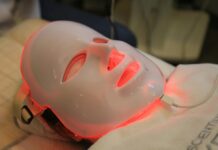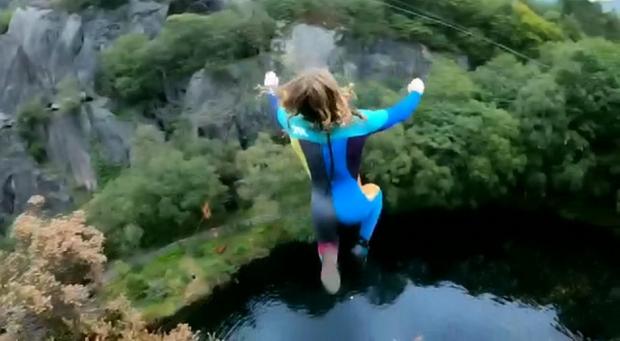Charities urge cliff jumpers to think before they leap
Another serious cliff jumping accident in Wales has strengthened the resolve of water safety organisations in trying to reduce incidents.
Cliff jumping has been taking place for generations, but increasing numbers are now giving it a try thanks mainly to publicity via social media; the outcome of getting a jump wrong can include death or life changing injuries.
During the school holidays , Water Safety Wales, a group of more than 30 organisations focused on reducing drowning and serious incidents, are encouraging jumpers to stay safe.
In the latest incident at the Blue Lagoon, near Abereiddy in Pembrokeshire, a person in their early 20s had to be airlifted to hospital with back injuries. It follows an incident in April where a man suffered life changing injuries after jumping from cliffs close to Langland Bay, Swansea, and another where a man was recovered unconscious from the water after jumping from cliffs at St Catherine‘s Island, Tenby. Fortunately, he regained consciousness and was taken to hospital.
Danni Harding, from Cardiff, suffered life changing injuries when she hit rocks jumping from a waterfall in 2018. Danni, 30, who ran a successful security firm prior to her accident, broke her back and now lives with a series of debilitating health problems.
She says: ‘I didn’t realise that the hot weather had made the water level lower than normal. I was having the greatest time – I’d jumped nine times, until I made that one wrong move and now I have to live with the fact that I have fits, I have a stammer and I have endless hospital appointments.
‘I went from being a 24/7 business owner and mother to being stuck in my bedroom, unable to move. It felt my life was just taken away and it was down to one mistake, one wrong move.
‘If I had been better educated about the risks, I might have made a better choice about jumping that last time in the way I did.’
These incidents highlight the very serious outcomes which regularly hit the headlines because of cliff jumping at coastal and inland locations in Wales. Jumping under the influence of alcohol is especially hazardous with people unable to calculate the risks or the consequences.
Water Safety Wales is working with the organisations behind AdventureSmart UK, a campaign aimed at encouraging people to enjoy the outdoors safely, to look at ways of reducing the number of emergency incidents involving cliff jumping.
The group are urging jumpers to ‘look 5 times before they leap‘.
-
- How cold? First take a dip to get used to the cold water before you jump
- Any obstacles? Wearing a mask check the water first for depth, rocks, debris or approaching boats
- Is it as deep as it looks? Keep checking; water depth changes quickly with tide and rainfall
- How high, how far? Start low & only jump if you are confident you can make the distance
- Easy exit? Will currents and conditions allow you to get out?
If you doubt you can nail it safely – DON‘T JUMP
Paul Donovan, Project Manager of AdventureSmart UK, said: ‘We hope anyone thinking about jumping into water, especially from height will think carefully about whether it is a good idea. Sadly, the consequences of getting it wrong are often extremely serious.”
The project will identify popular jump sites, both coastal and inland; provide case studies of problem sites and liaise with landowners and emergency services to provide better control measures to reduce the level of risk.
This research has identified 28 sites of serious concern; 18 coastal; three inland and seven quarries. They have undertaken case studies at Langland Bay; Swyd Gwladys waterfall; Burley Hill quarry; Cardiff Bay and Tenby harbour.
The many variables of cliff jumping include water depth, particularly at coastal sites where it can alter with the tide; at inland sites levels water levels can change with rainfall/dry spells and the water may be shallower than it seems; submerged objects can cause fatalities or serious injury; the shock of cold water can make it difficult to swim and strong currents can rapidly sweep people away.
Chris Cousens, Chair of Water Safety Wales, said:
“We‘ve seen a number of serious incidents recently in Wales linked to people jumping into water from height and we want people to understand the serious risks associated with this activity. So, we urge anyone in, on or near open water to #RespectTheWater and:
- Be prepared. Know the risks and take steps to stay safe.
- If you get into trouble Float to Live – lie on your back and relax, resisting the urge to thrash about
- Call 999 in an emergency and ask for the Coastguard at the coast or Fire and Rescue Service for inland waters”
A communication strategy aimed at reducing injury is also being developed for all levels of media and based on the five key messages
Help keep news FREE for our readers
Supporting your local community newspaper/online news outlet is crucial now more than ever. If you believe in independent journalism, then consider making a valuable contribution by making a one-time or monthly donation. We operate in rural areas where providing unbiased news can be challenging. Read More About Supporting The West Wales Chronicle


























